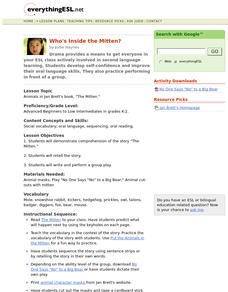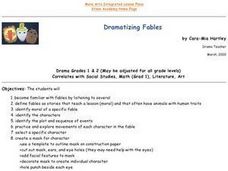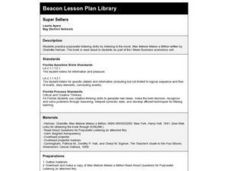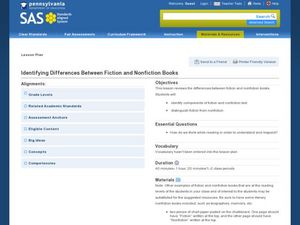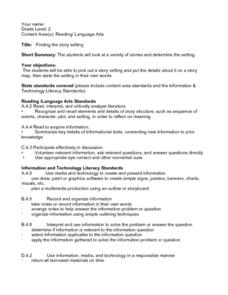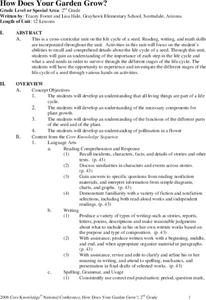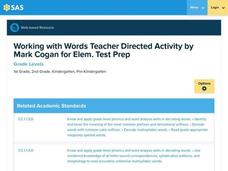Curated OER
Timelines
Students discover the look and purpose of timelines. After the teacher reads them a story, they discuss the events that occurred during King Tutankhamen's life. They create a timeline of his life making sure to put them in the correct...
Curated OER
Steps to Freedom
Students complete discussion and reading comprehension activities for the novel Almost to Freedom by Vaunda Micheax Nelson. In this African American history lesson, students discuss the Underground Railroad and complete a reading...
Curated OER
Second Graders Create Their Own Social Studies Book (Part I, The 5Ws of the Constitution)
Students develop their own social studies textbook using a blank theme book as they complete activities and learning experiences throughout the year. The activities are in art, music, simulations, read alouds, shared writing and a class...
Curated OER
Folk Tales Thematic Unit
Second graders read different folk tales and discuss them. They are given a template of a letter and they are to write a friendly letter. Special education students are paired with advanced students to help them.
Curated OER
Who's Inside the Mitten?
Pupils read "The Mitten", by Jan Brett. They discuss vocabulary presented in the story and sequence significant plot events. They make masks to represent several of the characters and act out the story.
Curated OER
Dramatizing Fables
Young scholars familiarize themselves with fables by listening to several of them. They define fables. They identify the moral of a specific fable. They identify characters, plot and sequence of events. They create a mask of a character...
Curated OER
Narrative Prompt
Second graders are introduced to the style of a narrative writing. After being read a story, they use a graphic organizer to plan their writing. With a partner, they share their ideas and decide on one topic to write about. To end the...
Curated OER
Super Sellers
Practice listening skills with the novel Max Malone Makes a Million written by Charlotte Herman. Read a chapter a day and answer daily questions such as predicting how Max makes his money.
Curated OER
Identifying Differences Between Fiction and Nonfiction Books
Learners explore the differences between fiction and non-fiction book. In this genre study activity, students read examples of fiction and non-fiction and identify the characteristics of each genre. Learners list the characteristics on a...
Curated OER
Narrative Writing
Second graders select and read a variety of stories and discuss what happened in the story that made the day so special. Using a graphic organizer, 2nd graders brainstorm ideas about their best day at school. They compose a story...
Curated OER
Narrative Prompt - Lesson 2
Second graders review the structure of a narrative piece of writing. Individually, they write a narrative based on their best day of school. After being read different stories, they share their own narratives with the class. They are...
Curated OER
Unleashed: Poems by Pets
Students create a poem from the first person perspective of a pet. In this Writing/Poetry instructional activity, students read a short poem from, Unleashed. Students brainstorm what their animal may say. Students write a poem using the...
Curated OER
Making Predictions by Analyzing Key Ideas and Details
Young scholars make predictions. In this language arts instructional activity, students read nonfiction texts and make predictions about what they are going to read. Young scholars confirm and revise their predictions as they read the text.
Curated OER
Then What Happened?
Students complete activities about the story "Diary of a Worm", by Doreen Cronin. In this reading comprehension lesson, students make predictions and apply prior knowledge about the topic of the story. They actively listen as the book is...
Pennsylvania Department of Education
6 Traits: Organization
Students make logical patterns in their writing to demonstrate the trait of organization. In this organization lesson plan, students focus on events proceeding logically.
Pennsylvania Department of Education
6 Traits: Voice
Young scholars explore the trait of voice. In this language arts lesson, students focus on the writing trait of voice. Young scholars view a video and practice writing.
Pennsylvania Department of Education
6 Traits: conventions
Students watch a video and write using conventions. In this conventions lesson plan, students edit their writing for the correct spelling, grammar, and paragraph usage.
Curated OER
ACE Expert English Homework #15
In this sequencing worksheet, students order pictures, order sentences, describe pictures, and more. Students complete 8 activities.
Curated OER
Finding the Story Setting
Second graders discuss important things to know when reading stories, identify setting in variety of stories, create story map to record information as they are reading, state setting in their own words, discuss whether they thought...
Curated OER
How Does Your Garden Grow?
Students complete activities to learn about the life cycle of a seed. In this plant growth lesson, students complete activities for the life cycles of seeds.
Curated OER
The Very Busy Spider
Learners read the story The Very Busy Spider and go on a spider hunt, complete a KWL chart, talk about the animals in the book, and more. In this guided reading lesson plan, students take 5 days to read the book.
Pennsylvania Department of Education
Working with Words Teacher Directed Activity by Mark Cogan for Elem. Test Prep
Young scholars build word families. In this interactive language arts activity, students visit a website where they play a game creating word families. Young scholars may print out their work when finished.
Curated OER
Understanding the Roots
Students investigate the parts of a flower. In this earth science lesson, students read the book The Magic School Bus Plants Seeds and identify various plant parts. Students construct a model of a flowering plant from various art supplies.
Curated OER
Then What Happened?
Students read the book, Diary of a Worm, by Doreen Cronin. After answering questions, the do a variety of activities such as a "Dear Diary," "Book Report Card," and/or "Animal Mural."






